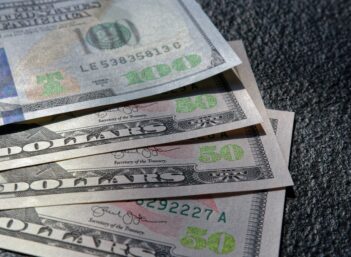Americans spend $74 billion annually on hidden credit card fees, most notably on late fees. In addition to wasted money, this also affects your credit report (which can result in a lower credit score).
If you’re chronically late for everything, including paying bills, these tips will help you get back on track and reaping the benefits.
6 Ways You Can Avoid Late Fees on A Credit Card
Credit card companies make money in several ways. One way is by charging account holders a late fee if they fail to pay the minimum amount by the due date. There are 6 simple steps you can take to avoid late fees completely.
1. Set an Alert for Payment Due Date
To avoid missing a payment, set an alert for the payment due date. Credit card cycles are predictable, and bills are due around the same day each month. Many card companies enable you to set up an automatic reminder on your account’s web dashboard, and the system should send an email reminder to your inbox or via a text message.
You can set a note on your smartphone calendar or go old-school: circle the date on the calendar.
2. Actually Open Your Mail
There’s more than junk mail in your physical mailbox. Credit card companies mail important information to card holders, including statements. Check your monthly statement to ensure that your charges are correct and pay at least the minimum (preferably, the full amount due to avoid interest) by the due date.
Protect Your Information
Don’t forget to shred any documents like credit card statements that contain your full name, address, account number, and any other information that could be used by thieves to steal card information or your identity. A weekly shred shredder of old statements and mail can save you from the headache of identity theft.
Note: If you don’t have a shredder, you can rip paperwork into tiny pieces and dispose of it in multiple trash bags.
3. Sign Up for E-Statements
Credit card companies also offer e-statements you can download from your account dashboard. Rather than mailing your statement, card companies will email you a prepared statement. Just open the email, log into your account, and pay it.
Avoid Phishing Scams
That said, never click on a link contained in an email. Many phishing scams use emails that look like those that come from a trusted source (such as a bank or credit card company) in order to collect your username and password.
When your e-statement notification arrives, log out of your email, close the browser you’re using, and open a new browser or browser tab. Then, navigate to the card company website and log in. This protects you from being duped into clicking a potentially malicious link.
4. Request a Copy of Your Credit Report
Checking your credit report makes you more aware of the various factors that can impact your score (including the timeliness of credit card payments). You can see if any outstanding balances or late payments have impacted your score. It may also help you spot possible fraud or identity theft in the event excess credit cards have been opened in your name.
Where to Apply for a Free Credit Report
The Fair Credit Reporting Act entitles all consumers to one free credit report per year. Starting in 2020 and through the end of 2026, Americans can get up to six free credit reports through Equifax.
To obtain one free credit report, choose from one of the following options. One report will be sent to you from the three bureaus through Annual Credit Report (which acts as the intermediary between the credit bureaus).
- Call Annual Credit Report at 1-877-322-8228
- Visit www.annualcreditreport.com
- Or complete the Annual Credit Report Request Form and mail it to: Annual Credit Report Request Service, P.O. Box 105281, Atlanta, GA 30348-5281
If you’d like to take advantage of the Equifax offer, go to their website or call 1-866-349-5191. You may request an Equifax report in addition to the free annual report.
5. Set Up Automatic Payments
Automatic payments ensure that your bills are paid without requiring you to think about due dates. To set up automatic payments, visit the credit card issuer’s website, log into your account, and set it up on the account dashboard.
You will need to provide your bank name, routing number, and account number. All of this information may be found in your bank book, on a check, or on your account (after logging into your bank’s personal banking site).
Some people caution against automatic payments because you may fail to catch fraudulent activity if bills are paid automatically. Be sure to check your charges and your bank account for any unusual activity. If you spot charges that you did not make, contact the card company immediately.
6. Ask to Have the Credit Card Fee Waived
Credit card companies know that mail can get lost or email alerts may end up in the junk folder. Most companies will waive the late fee on one occasion, especially if you have a history of paying on time. Contact the card company through their customer service line and ask for the late fee to be waived.
Credit Card Late Fees Have a Serious Impact
According to Equifax, one of the major credit reporting bureaus, even one missed or late payment can negatively impact your credit report.
What Happens When You have a Poor Credit Report or Score?
- The late payment note may remain on your credit report for seven years.
- Late payments can drag down your overall credit score.
- A lower credit score can make it difficult to obtain a mortgage, car loan, or student loan.
- Lenders may charge higher interest rates to people with poor credit scores.
Credit Cards with No Late Fees
There are a few credit cards that have no late fees. The CitiSimplicty card comes with no late fees and several other benefits. Like all credit cards, be sure to review the terms and conditions. Even with the positive of no late fee, there may be drawbacks. With the CitiSimplicity card, high interest rates are charged on foreign transactions (which may be a drawback for some).




